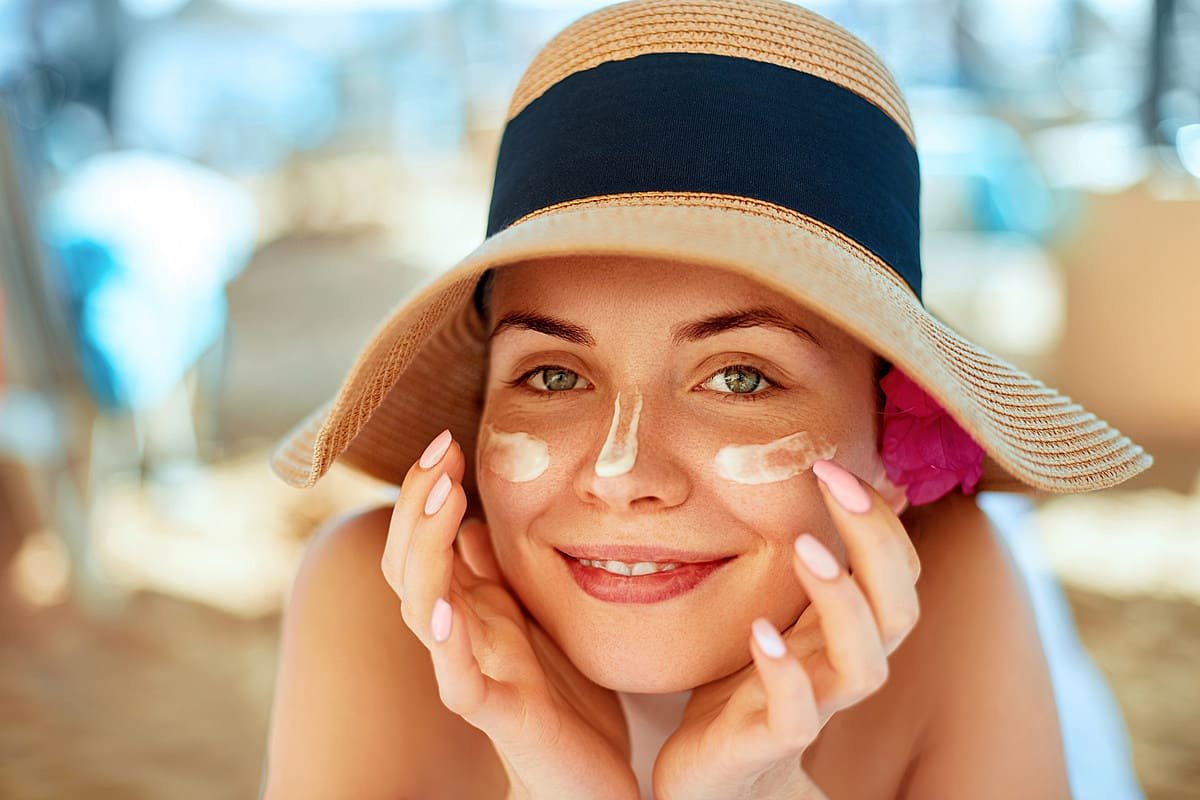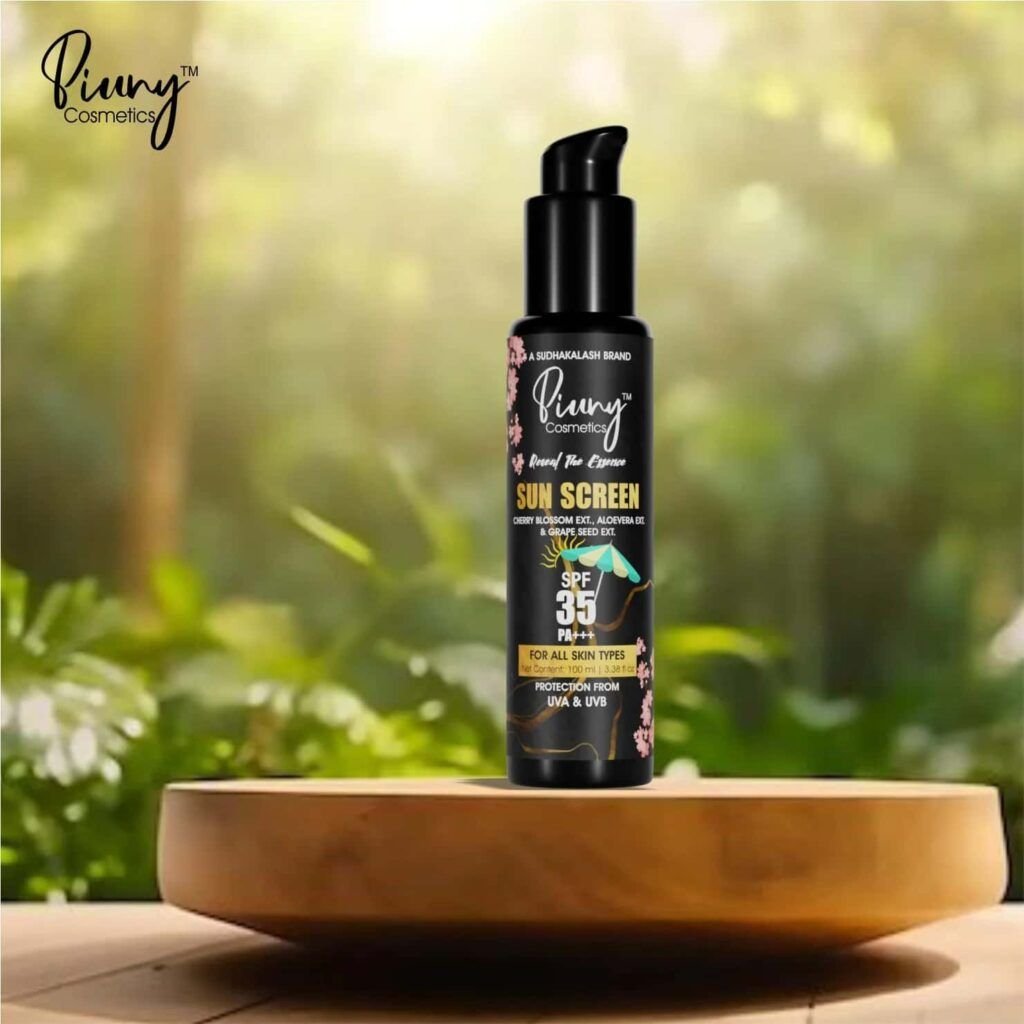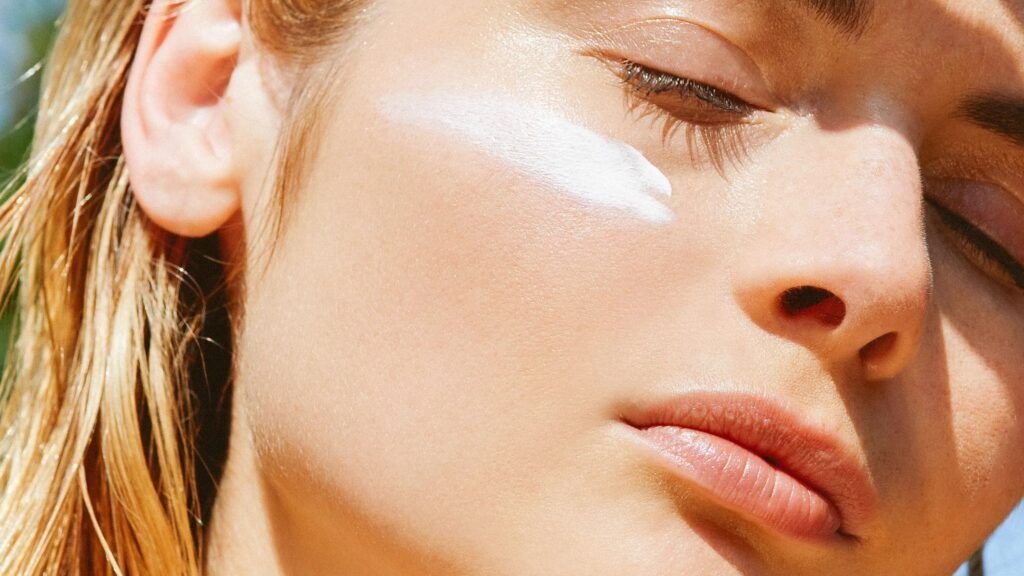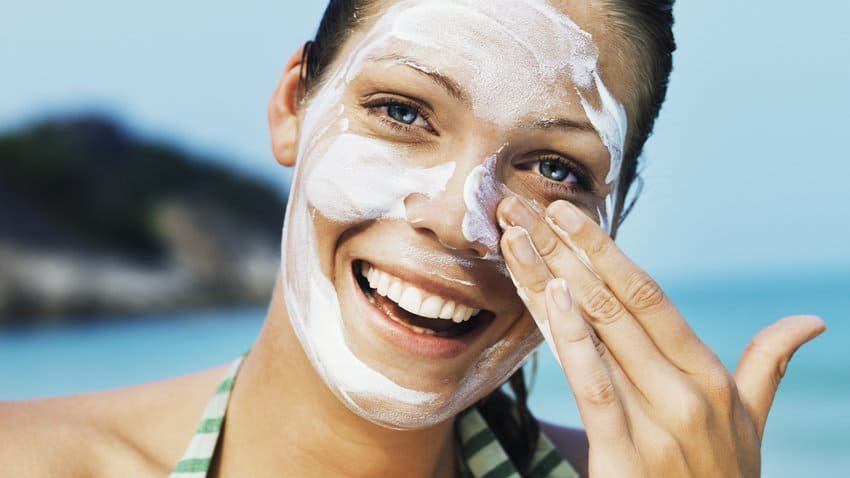Your cart is currently empty!

The 5 Ultimate Guide: How to Choose the Right Sunscreen for Optimal Skin Protection

Table of Contents
Choosing the right sunscreen for your face is paramount in ensuring optimal skin protection against the sun’s harmful rays. With the myriad of options available on the market, it can be overwhelming to find the perfect match for your skin’s needs. However, fear not! In this comprehensive guide, we’ll unveil five expert strategies to help you select the best sunscreen protection for your face, ensuring not only defense against sun damage but also maintaining your skin’s health and radiance.
Understanding your skin type is crucial for choosing the best sunscreen protection for face. Whether oily, dry, or sensitive, tailored formulations address specific concerns effectively. Oily skin benefits from lightweight, oil-free options, while dry skin thrives with moisturizing sunscreens. Sensitivity-prone skin requires gentle, fragrance-free choices to minimize irritation.
Secondly, consider the SPF level of the sunscreen you choose. Opt for a minimum SPF of 30 to shield your face from UVB rays, which cause sunburn and skin damage. Additionally, ensure the sunscreen provides broad-spectrum protection, guarding against both UVB and UVA rays to prevent premature aging and reduce the risk of skin cancer.

Thirdly, take into account the formulation and texture of the sunscreen. Lightweight, non-greasy formulations are ideal for daily wear, providing comfortable protection without leaving behind a residue. Whether you prefer moisturizing lotions, weightless serums, or mattifying gels, selecting a sunscreen with a texture that suits your skin’s needs is essential for a pleasant user experience.
Furthermore, pay attention to specific ingredients that can enhance the effectiveness of your sunscreen while providing additional benefits for your skin. Antioxidants like vitamin C and E help combat free radical damage, while hyaluronic acid and glycerin provide hydration and promote skin health. Seek out sunscreens enriched with these ingredients for added nourishment and protection.
Lastly, don’t forget about the importance of reapplication. Applying sunscreen once in the morning isn’t sufficient to keep your face protected throughout the day. Remember to reapply every two hours, or immediately after swimming, sweating, or towel drying. Choosing a portable sunscreen option ensures easy touch-ups on the go, maintaining continuous protection for your skin. By following these five strategies, you can confidently select the best sunscreen protection for your face, safeguarding your skin’s health and beauty for years to come.
Determining Your Skin Type for Effective Sunscreen Selection
Understanding your skin type is paramount when it comes to selecting the right sun-screen for optimal protection and skincare. By identifying whether you have oily, dry, sensitive, or combination skin, you can tailor your sunscreen choice to address your specific needs and concerns.

Oily Skin:If you have oily skin, you’re no stranger to dealing with excess sebum production and the risk of clogged pores. When selecting a sunscreen, opt for oil-free or non-comedogenic formulations that won’t exacerbate shine or lead to breakouts. Look for lightweight, mattifying sunscreens that absorb quickly into the skin without leaving behind a greasy residue. These sunscreens provide effective protection against UV rays without adding extra oil to your skin.
Dry Skin:Dry skin craves hydration and moisture to maintain its health and vitality. When choosing a best sunscreen, opt for formulations that offer moisturizing properties to combat dryness and prevent flakiness. Look for sunscreens enriched with hydrating ingredients like hyaluronic acid, glycerin, or ceramides to help replenish and nourish your skin. Creamy or lotion-based sunscreens provide an extra layer of hydration, leaving your skin feeling soft and supple while offering sun protection.
Sensitive Skin:Sensitive skin requires extra care and attention to avoid irritation and inflammation. When selecting a sun-screen, opt for gentle, fragrance-free formulations specifically designed for sensitive skin. Look for hypoallergenic and dermatologist-tested sun-screens that minimize the risk of adverse reactions. Avoid sunscreens containing potential irritants like alcohol, artificial fragrances, or chemical filters. Instead, choose mineral-based sunscreens with soothing ingredients like zinc oxide or titanium dioxide, which provide broad-spectrum protection without causing sensitivity.
Combination Skin:Combination skin poses a unique challenge, with areas of both oiliness and dryness on the face. When choosing a sunscreen, look for lightweight, non-greasy formulations that balance hydration without clogging pores. Gel-based or water-based sunscreens are ideal for combination skin, offering hydration where needed while mattifying oily areas. Consider using different sunscreens for different areas of your face to address individual concerns effectively.
By understanding your skin type and selecting a sun-screen tailored to your specific needs, you can ensure effective protection against the sun’s harmful rays while promoting overall skin health and vitality. Whether you have oily, dry, sensitive, or combination skin, there’s a sunscreen formulation out there to meet your unique skincare needs.
Assessing SPF Requirements for the Best Sunscreen Protection For Face
When it comes to selecting the best sun-screen for your skin, understanding Sun Protection Factor (SPF) is essential. SPF measures a sunscreen’s ability to protect your skin from UVB rays, which are responsible for sunburn and contribute to skin cancer risk. Assessing your SPF requirements involves considering factors such as your skin type, the intensity of sun exposure, and any specific skin concerns.

Minimum SPF Guidelines:For daily sun protection, dermatologists recommend using a sun-screen with a minimum SPF of 30. This level of protection blocks approximately 97% of UVB rays, providing a high degree of protection against sunburn and skin damage. However, individuals with fair or sensitive skin may require higher SPF levels for optimal protection, especially during prolonged sun exposure or outdoor activities.
Skin Type Considerations:Your skin type plays a crucial role in determining your SPF requirements. Those with fair or sensitive skin are more susceptible to sunburn and may benefit from higher SPF levels, such as SPF 50 or higher, to provide added protection against UV damage. Conversely, individuals with darker skin tones may be less prone to sunburn but are still at risk of skin damage and should use a sunscreen with a minimum SPF of 30 for adequate protection.
Intensity of Sun Exposure:The level of sun exposure you anticipate also influences your SPF requirements. If you plan to spend extended periods outdoors or participate in activities like swimming or sports, opt for a broad-spectrum sunscreen with a higher SPF to ensure prolonged protection against UV radiation. Additionally, consider factors such as altitude, geographical location, and time of day, as these can impact the intensity of UV rays and your risk of sunburn.
Specific Skin Concerns:Individuals with certain skin concerns, such as a history of skin cancer, photosensitivity disorders, or a compromised immune system, may require specialized sunscreens with higher SPF levels or additional protective features. Consult with a dermatologist to determine the best sunscreen for your specific needs and concerns, ensuring comprehensive protection against sun damage while addressing any underlying skin conditions.
By assessing your SPF requirements based on your skin type, the intensity of sun exposure, and any specific skin concerns, you can select the best sun-screen to safeguard your skin against the sun’s harmful rays effectively. Remember to apply sunscreen generously and reapply regularly, especially during prolonged sun exposure, to maintain optimal protection and promote healthy skin.
Choosing Your Preferred Formulation for the Best SPF for Face
Selecting the right formulation of sun-screen is essential for ensuring optimal protection and comfort, especially when it comes to safeguarding the delicate skin on your face. With a variety of formulations available, ranging from lotions to gels to serums, finding the best SPF for your face involves considering factors such as texture, skin type, and personal preference.

Lightweight Lotions and Creams:Lotions and creams are classic sun-screen formulations that offer versatility and ease of application. These formulations are well-suited for daily wear, providing adequate sun protection while delivering essential hydration to the skin. Lightweight lotions absorb quickly into the skin, leaving behind a smooth, non-greasy finish that is comfortable for all-day wear. Creams, on the other hand, offer a richer texture that is ideal for individuals with dry or dehydrated skin, providing lasting moisture and nourishment.
Refreshing Gels:Gel-based sun-screens are perfect for those with oily or acne-prone skin who seek lightweight, non-comedogenic formulas that won’t clog pores or exacerbate shine. Gel formulations are water-based and absorb quickly into the skin, leaving behind a weightless, matte finish that feels refreshing and breathable. These sun-screens provide effective SPF protection without leaving a greasy residue, making them an excellent choice for individuals who prefer a lightweight, barely-there feel.
Weightless Serums:Serum-based sun-screens offer a unique blend of lightweight texture and potent skincare benefits. These formulations are typically infused with antioxidants and other skin-loving ingredients, providing dual-action protection against UV damage and environmental aggressors. Serums absorb quickly into the skin, delivering a surge of hydration and leaving behind a silky-smooth finish. Ideal for those with combination or sensitive skin, serum-based sunscreens offer a comfortable, non-greasy feel that is perfect for daily use.
Matte-Finish Options:For individuals seeking a shine-free complexion, matte-finish sunscreens are an excellent choice. These formulations are specifically designed to control excess oil and minimize shine, making them ideal for those with oily or combination skin. Matte-finish sun-screens offer effective SPF protection while providing a smooth, velvety finish that helps to blur imperfections and control shine throughout the day. Whether in lotion, gel, or serum form, these sunscreens offer a comfortable, matte look that lasts.
By considering factors such as texture, skin type, and personal preference, you can choose the best SPF formulation for your face that provides effective sun protection while ensuring comfort and satisfaction. Whether you prefer lightweight lotions, refreshing gels, weightless serums, or matte-finish options, there’s a sunscreen formulation out there to suit your individual needs and preferences.
Selecting Your Preferred Ingredients: How to Choose the Best Sunscreen
Choosing the best sun-screen involves more than just considering SPF levels and formulation. Delving into the ingredients list is essential to ensure that your sunscreen provides effective protection while also meeting your skin’s specific needs and preferences.

Mineral-Based Sunscreens:Mineral sun-screens, containing active ingredients like zinc oxide and titanium dioxide, offer physical protection by forming a barrier on the skin’s surface and reflecting UV rays. These ingredients are gentle on the skin and less likely to cause irritation, making them suitable for sensitive skin types. Mineral sunscreens are also reef-safe and environmentally friendly, making them an excellent choice for eco-conscious consumers.
Chemical-Based Sunscreens:Chemical sunscreens contain organic compounds such as avobenzone, octinoxate, and oxybenzone, which absorb UV rays and convert them into heat, providing protection from the sun. While chemical sunscreens are generally effective and offer lightweight, invisible coverage, some individuals may experience sensitivity or irritation due to the active ingredients. It’s essential to patch-test chemical sunscreens before full application, especially if you have sensitive skin.
Additional Skin-Nourishing Ingredients:Beyond sun protection, many sun-screens are formulated with additional skincare ingredients to provide added benefits for the skin. Look for sunscreens enriched with antioxidants like vitamin C and E, which help neutralize free radicals and protect against environmental damage. Hydrating ingredients such as hyaluronic acid, glycerin, or aloe vera can help keep the skin moisturized and supple, preventing dryness and dehydration. Niacinamide and licorice extract are known for their soothing properties, making them ideal for calming sensitive or irritated skin.
Fragrance-Free and Hypoallergenic Formulations:For individuals with sensitive skin or fragrance allergies, choosing a sunscreen that is fragrance-free and hypoallergenic is essential to prevent irritation and adverse reactions. Opt for sunscreens labeled as hypoallergenic or formulated without added fragrances, dyes, or harsh chemicals to minimize the risk of sensitivity or allergic reactions.
By selecting sun-screen formulations with preferred ingredients that align with your skin’s needs and sensitivities, you can ensure effective sun protection while promoting healthy, radiant skin. Whether you opt for mineral-based or chemical-based sunscreens, prioritize ingredients that nourish and protect your skin, providing comprehensive defense against the sun’s harmful rays while supporting your skin’s overall health and vitality..
Practicing Proper Application and Reapplication of Sunscreen
Ensuring effective sun protection goes beyond simply choosing the right sun-screen; it also involves proper application and diligent reapplication to maintain continuous defense against the sun’s harmful rays. By following best practices for sun-screen application and reapplication, you can maximize its effectiveness and safeguard your skin against sun damage.

Initial Application:Begin by applying sun-screen generously to all exposed areas of skin at least 15 minutes before sun exposure. Use enough sun-screen to cover the entire area evenly, including the face, neck, ears, arms, and any other exposed areas. Don’t forget commonly overlooked areas like the tops of the feet, hands, and scalp if not covered by hair. Rub the sunscreen into the skin until it is fully absorbed, ensuring thorough coverage for maximum protection.
Proper Techniques:When applying sun-screen to the face, use gentle, upward motions to massage the product into the skin, being careful to avoid the delicate eye area. Consider using a separate facial sun-screen formulated specifically for the face, as these products are often lighter in texture and less likely to clog pores. For optimal protection, reapply sunscreen every two hours, or immediately after swimming, sweating, or towel drying, as these activities can compromise the sunscreen’s effectiveness.
Reapplication:Regular reapplication of sun-screen is crucial for maintaining continuous protection throughout the day, especially during prolonged sun exposure or outdoor activities. Carry a portable sunscreen with you for easy touch-ups on the go, ensuring that you’re always prepared to reapply as needed. If using makeup over sun-screen, opt for powder-based products with built-in SPF for added protection and convenience.
Additional Tips:Check the expiration date of your sun-screen regularly and discard any expired products, as they may no longer provide adequate protection. Consider using a water-resistant sun-screen for activities like swimming or exercising outdoors, as these formulations are designed to withstand water and sweat. Seek shade whenever possible and wear protective clothing, hats, and sunglasses to further minimize sun exposure and reduce the risk of sunburn and skin damage.
By practicing proper application and reapplication of sun-screen, you can ensure comprehensive protection against the sun’s harmful rays and maintain the health and beauty of your skin for years to come. Incorporate sunscreen into your daily skincare routine and make it a habit to reapply regularly, empowering yourself with the knowledge and tools to protect your skin from sun damage effectively.
Conclusion:
In the pursuit of healthy, radiant skin, sun-screen emerges as a non-negotiable ally, offering vital protection against the sun’s damaging UV rays. Throughout this comprehensive guide, we’ve explored the essential factors to consider when selecting and applying sunscreen, empowering you with the knowledge and tools to make informed choices for optimal sun protection and skincare.
Understanding your skin type lays the foundation for effective sun-screen selection, allowing you to choose formulations tailored to your specific needs and concerns. Whether you have oily, dry, sensitive, or combination skin, there’s a sun-screen formulation designed to address your unique requirements, ensuring comfort and efficacy.
Assessing SPF requirements is paramount in determining the level of protection needed for your skin. By considering factors such as skin type, the intensity of sun exposure, and personal preferences, you can select the appropriate SPF level to safeguard against sunburn, premature aging, and skin cancer.
Choosing the right formulation of sun-screen enhances both protection and user experience. From lightweight lotions to refreshing gels to weightless serums, there’s a sunscreen texture suited to your preferences and skin type, ensuring comfortable wear and effective coverage.
Selecting sun-screen with preferred ingredients further enhances its benefits for the skin. Whether opting for mineral-based or chemical-based formulations, prioritize ingredients that nourish, protect, and soothe the skin, promoting overall health and vitality.
Practicing proper application and reapplication of sun-screen is essential for maintaining continuous protection throughout the day. By following best practices, such as applying generously, reapplying regularly, and seeking shade when possible, you can ensure optimal sun protection and minimize the risk of sun damage.
In conclusion, by incorporating sun-screen into your daily skincare routine and making informed choices based on your skin’s needs and preferences, you can safeguard your skin against the sun’s harmful rays and maintain its health and beauty for years to come. Embrace sunscreen as a vital component of your skincare arsenal, empowering yourself to enjoy the outdoors while protecting and nurturing your skin.




Leave a Reply